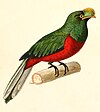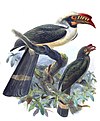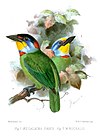Green toucanet
| Green toucanet | |
|---|---|

| |
| Emerald toucanet (Aulacorhynchus prasinus) | |
| Scientific classification | |
| Domain: | Eukaryota |
| Kingdom: | Animalia |
| Phylum: | Chordata |
| Class: | Aves |
| Order: | Piciformes |
| Family: | Ramphastidae |
| Genus: | Aulacorhynchus Gould, 1835 |
| Type species | |
| Pteroglossus sulcatus[1] Swainson, 1820
| |
| Species | |
|
see text | |
| Synonyms | |
| |
Green toucanets[2] are near-passerine birds from the genus Aulacorhynchus in the toucan family. They are native to Mexico, and Central and South America. All are found in humid forests and woodlands in highlands, but a few also occur in adjacent lowlands.[3] They are relatively small toucans, 30–44 centimetres (12–17 in) long, with colorful, mainly green, plumage.[3] They are typically seen in pairs or small groups, and sometimes follow mixed species flocks.[4]
Taxonomy and systematics
[edit]A major taxonomy review in 1974 resulted in 6 species in the genus Aulacorhynchus,[5] and this was adopted by virtually all later authorities.[3][6][7][8][9]
In 2001, it was suggested that A. prasinus, as traditionally defined, was a species complex that should be split into 7 different species based on preliminary morphological evidence.[10] This was to some extent supported by genetic evidence, which suggested that additional species should be recognized. As a result, A. griseigularis was split from in A. albivitta based on this early genetic evidence but these species are now lumped together again.[11][12]
Currently, there remains a considerable lack of consensus to support the IOC's latest taxonomy of Aulacorhynchus into eleven species.[13] Several authorities still maintain that the genus Aulacorhynchus has only 7 species and treat the remaining as subspecies.[8][9] The SACC has called for further genetic studies of this genus.[6]
Species
[edit]The genus Aulacorhynchus has eleven species considered to belong to the genus:
| Image | Scientific name | Common Name | Distribution |
|---|---|---|---|
| Aulacorhynchus wagleri | Wagler's toucanet | Sierra Madre del Sur of Guerrero and Oaxaca in south-western Mexico | |
 |
Aulacorhynchus prasinus | Emerald toucanet | Mexico and Central America |
 |
Aulacorhynchus caeruleogularis | Blue-throated toucanet | Costa Rica, Panama and Colombia |
 |
Aulacorhynchus albivitta | White-throated toucanet | Andes from western Venezuela, through Colombia to northern Ecuador |
 |
Aulacorhynchus atrogularis | Black-throated toucanet | central Ecuador to western Bolivia |
 |
Aulacorhynchus sulcatus | Groove-billed toucanet | eastern Colombia and northern Venezuela |
 |
Aulacorhynchus derbianus | Chestnut-tipped toucanet | Colombia to central Bolivia |
| Aulacorhynchus whitelianus | Tepui toucanet | Guiana | |
 |
Aulacorhynchus haematopygus | Crimson-rumped toucanet | Ecuador, Colombia and Venezuela |
| Aulacorhynchus huallagae | Yellow-browed toucanet | east Andean slope in northern Peru. | |
 |
Aulacorhynchus coeruleicinctis | Blue-banded toucanet | Bolivia and Peru. |
References
[edit]- ^ "Ramphastidae". aviansystematics.org. The Trust for Avian Systematics. Retrieved 2023-07-25.
- ^ Boyd, J. (2011). Ramphastidae: Toucans. Accessed 20 May 2011
- ^ a b c Short, L. L., & Horne, J. F. M. (2002). Toucans (Ramphastidae). pp. 220-272 in del Hoyo, J., Elliott, A., & Sargatal, J. eds. (2002). Handbook of the Birds of the World. Vol. 7 Jacamars to Woodpecker. Lynx Edicions, Barcelona. ISBN 84-87334-37-7
- ^ Restall, R. L., Rodner, C., & Lentino, M. (2006). Birds of Northern South America. Christopher Helm, London. ISBN 0-7136-7243-9 (vol. 1). ISBN 0-7136-7242-0 (vol. 2).
- ^ Haffer, J. (1974). Avian speciation in tropical South America. Publ. Nuttall Ornithol. Club 14: 1–390.
- ^ a b Remsen, J. V., Jr., C. D. Cadena, A. Jaramillo, M. Nores, J. F. Pacheco, J. Pérez-Emán, M. B. Robbins, F. G. Stiles, D. F. Stotz, and K. J. Zimmer (2011). A classification of the bird species of South America: Trogoniformes to Piciformes. Archived 2011-09-12 at the Wayback Machine American Ornithologists' Union. Accessed 25 May 2011
- ^ Fjeldså, J., and Krabbe, N. (1990). Birds of the High Andes. ISBN 87-88757-16-1
- ^ a b Dickinson, E. C., eds. (2003). The Howard and Moore Complete Checklist of the Birds of the World. 3rd edition. ISBN 0-7136-6536-X
- ^ a b Clement, J. F. (2007, w. online updates). The Clements Checklist of the Birds of the World. 6th edition. ISBN 978-0-7136-8695-1
- ^ Bonaccorso, E., Guayasamin, J. M., Peterson, A. T., and Navarro-Sigüenza, A. G. (2011). Molecular phylogeny and systematics of Neotropical toucanets in the genus Aulacorhynchus (Aves, Ramphastidae). Zoologica Scripta, 40. doi:10.1111/j.1463-6409.2011.00475.x
- ^ Puebla-Olivares, F., E. Bonaccorso, A. E. de los Monteros, K. E. Omland, J. E. Llorente-Bousquets, A. T. Peterson, and A.G. Navarro-Siguenza. (2008). Speciation in the Emerald Toucanet (Aulacorhynchus prasinus) complex. The Auk. 125(1): 39-50.
- ^ "IOC World Bird List 6.4". IOC World Bird List Datasets. doi:10.14344/ioc.ml.6.4.








